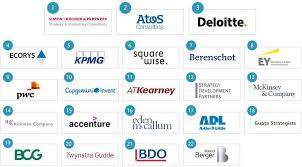Exploring the Top Brand Strategy Firms
The Best Brand Strategy Firms: Crafting Success Stories
In today’s competitive business landscape, establishing a strong and memorable brand is essential for success. This is where brand strategy firms play a crucial role in helping businesses define their identity, connect with their target audience, and stand out in the market.
What Makes a Brand Strategy Firm Stand Out?
The best brand strategy firms excel in understanding their clients’ unique needs, market positioning, and long-term goals. They conduct in-depth research, analyse market trends, and develop innovative strategies to create a compelling brand story that resonates with consumers.
Key Services Offered by Top Brand Strategy Firms:
- Brand Positioning: Defining what sets the brand apart from competitors
- Brand Identity: Creating visual elements that reflect the brand’s personality
- Messaging Strategy: Crafting compelling messages that communicate the brand’s values
- Market Research: Understanding consumer preferences and market trends
- Brand Architecture: Developing a cohesive structure for multiple product lines or sub-brands
Top Brand Strategy Firms in the Industry:
BrandCo: Known for its innovative approach to brand storytelling and creating emotional connections with consumers.
StratMark Agency: Specialises in data-driven strategies that drive measurable results and enhance brand visibility.
Visionary Brands Inc.: Recognised for its expertise in transforming brands into industry leaders through strategic positioning and creative execution.
The Impact of Effective Brand Strategy:
A well-crafted brand strategy not only helps businesses differentiate themselves but also builds trust, loyalty, and credibility among consumers. It sets the foundation for long-term success and growth by creating a strong brand presence in the minds of customers.
Nine Key Advantages of Top Brand Strategy Agencies: Crafting Distinctive Identities and Building Enduring Success
- Expertise in defining unique brand identities
- In-depth market research to understand consumer behaviour
- Tailored strategies that align with business goals
- Ability to create compelling brand stories that resonate with audiences
- Experience in developing cohesive brand architectures
- Track record of successful brand positioning and differentiation
- Creative approach to visual branding and design elements
- Focus on building long-term relationships with clients
- Commitment to staying updated with industry trends and best practices
Seven Drawbacks of Top-Tier Brand Strategy Firms: Cost, Flexibility, and Authenticity Concerns
- High cost of services compared to smaller agencies
- May have a lengthy onboarding process due to thorough research and analysis
- Limited flexibility in adapting strategies quickly to market changes
- Potential for conflicts of interest when working with multiple clients in the same industry
- Difficulty in measuring direct ROI from brand strategy initiatives
- Risk of losing brand authenticity if strategies are not aligned with core values
- Dependency on external expertise may hinder internal team development
Expertise in defining unique brand identities
One significant advantage of partnering with the best brand strategy firms is their expertise in defining unique brand identities. These firms possess the knowledge and skills to delve deep into a company’s values, vision, and target market to create a distinctive brand identity that sets it apart from competitors. By understanding what makes a brand special and crafting a compelling narrative around it, these firms help businesses establish a strong and memorable presence in the market, fostering customer loyalty and driving long-term success.
In-depth market research to understand consumer behaviour
One of the key advantages of partnering with the best brand strategy firms is their commitment to conducting in-depth market research to understand consumer behaviour. By delving into consumer preferences, trends, and motivations, these firms gain valuable insights that inform strategic decision-making. This thorough understanding allows them to tailor brand strategies that resonate with target audiences, create meaningful connections, and drive engagement. Ultimately, this focus on consumer behaviour empowers brands to position themselves effectively in the market and stay ahead of competitors.
Tailored strategies that align with business goals
One of the key advantages of working with the best brand strategy firms is their ability to develop tailored strategies that align perfectly with a business’s goals and objectives. These firms take the time to understand the unique needs and aspirations of their clients, conducting thorough research and analysis to create bespoke solutions that address specific challenges and opportunities. By crafting strategies that are closely aligned with the business’s overarching goals, brand strategy firms can help companies achieve greater clarity, focus, and success in their branding efforts.
Ability to create compelling brand stories that resonate with audiences
One of the key advantages of partnering with the best brand strategy firms is their exceptional ability to craft compelling brand stories that deeply resonate with target audiences. Through thorough research, creative insight, and strategic thinking, these firms can develop narratives that not only capture attention but also establish emotional connections with consumers. By weaving together elements of a brand’s history, values, and unique selling points into a captivating story, they can effectively communicate the brand’s identity and purpose in a way that resonates with and engages the audience on a deeper level. This skill in storytelling sets top brand strategy firms apart in helping businesses create memorable and impactful brand experiences that leave a lasting impression on consumers.
Experience in developing cohesive brand architectures
Best brand strategy firms excel in their experience of developing cohesive brand architectures. By understanding the intricate relationships between different elements of a brand, such as product lines and sub-brands, these firms can create a unified and strategic framework that ensures consistency and clarity across all brand touchpoints. This expertise not only strengthens the overall brand identity but also enhances consumer recognition and loyalty, ultimately driving long-term success for the business.
Track record of successful brand positioning and differentiation
One of the key advantages of partnering with the best brand strategy firms is their proven track record of successful brand positioning and differentiation. These firms have a deep understanding of market dynamics and consumer behaviour, allowing them to craft unique strategies that set their clients apart from competitors. By leveraging their expertise and experience, these firms can effectively position brands in a way that resonates with target audiences, creating a strong and memorable brand identity that drives success in the competitive business landscape.
Creative approach to visual branding and design elements
One notable advantage of the best brand strategy firms is their creative approach to visual branding and design elements. These firms have a deep understanding of the importance of visual identity in creating a strong brand presence. By leveraging their creativity and expertise, they can develop visually appealing and cohesive design elements that not only capture the essence of a brand but also resonate with the target audience. Through innovative graphic design, colour schemes, typography, and other visual elements, these firms can help businesses establish a unique and memorable brand image that sets them apart from competitors and leaves a lasting impression on consumers.
Focus on building long-term relationships with clients
Best brand strategy firms excel in their commitment to building long-term relationships with clients. By prioritising client satisfaction and understanding their unique needs, these firms go beyond delivering services to becoming trusted partners in their clients’ success. Through ongoing communication, collaboration, and support, brand strategy firms ensure that they are aligned with their clients’ goals and can adapt strategies to meet evolving needs. This focus on long-term relationships fosters mutual trust, loyalty, and a deep understanding of the client’s brand, resulting in more effective and impactful strategies that drive sustained growth and success.
Commitment to staying updated with industry trends and best practices
Best brand strategy firms demonstrate a strong commitment to staying updated with industry trends and best practices, ensuring that they provide their clients with cutting-edge strategies and innovative solutions. By continuously monitoring the evolving landscape of branding and communication, these firms can offer valuable insights and recommendations that align with the latest market developments. This dedication to ongoing learning and adaptation enables brand strategy firms to remain at the forefront of industry advancements, helping their clients stay ahead of the competition and achieve sustainable growth in a rapidly changing business environment.
High cost of services compared to smaller agencies
One significant drawback of opting for the best brand strategy firms is the high cost of their services in comparison to smaller agencies. While these top firms offer unparalleled expertise, resources, and a proven track record of success, their premium services often come with a hefty price tag that may not be feasible for all businesses, especially smaller or start-up companies with limited budgets. This cost disparity can pose a challenge for businesses looking to invest in top-tier brand strategy services while balancing financial constraints. It’s essential for companies to carefully weigh the benefits of working with prestigious brand strategy firms against the associated costs to determine the most suitable option that aligns with their budget and goals.
May have a lengthy onboarding process due to thorough research and analysis
One potential drawback of working with the best brand strategy firms is that they may have a lengthy onboarding process. This is often a result of their commitment to conducting thorough research and analysis to truly understand the client’s business, industry, target audience, and competitive landscape. While this detailed approach is crucial for developing effective brand strategies, it can sometimes lead to a longer timeframe before tangible results are seen. However, the investment in time and effort during the onboarding process typically pays off in the form of well-informed and impactful brand strategies that resonate with consumers and drive long-term success.
Limited flexibility in adapting strategies quickly to market changes
One significant drawback of some of the best brand strategy firms is their limited flexibility in adapting strategies quickly to market changes. While these firms excel in crafting long-term brand strategies, they may struggle to pivot rapidly in response to sudden shifts in consumer preferences, industry trends, or competitive landscapes. This lack of agility can hinder their ability to capitalise on emerging opportunities or address unforeseen challenges promptly. Businesses seeking brand strategy services should carefully consider this potential limitation and ensure that their chosen firm demonstrates the capability to adjust strategies swiftly in dynamic market environments.
Potential for conflicts of interest when working with multiple clients in the same industry
One significant con of engaging with the best brand strategy firms is the potential for conflicts of interest when these firms work with multiple clients operating within the same industry. This situation can raise concerns about impartiality and fair treatment, as the firm may inadvertently share sensitive information or strategies between competing clients. Such conflicts could compromise the confidentiality and integrity of the branding process, leading to distrust among clients and impacting the effectiveness of the brand strategies developed. It is crucial for businesses to carefully consider this risk and ensure transparency and clear boundaries when collaborating with brand strategy firms serving multiple clients in similar sectors.
Difficulty in measuring direct ROI from brand strategy initiatives
One significant challenge associated with the best brand strategy firms is the difficulty in measuring direct Return on Investment (ROI) from brand strategy initiatives. Unlike more tangible marketing efforts where ROI can be easily quantified, such as through sales figures or lead generation, the impact of brand strategy on financial performance is often indirect and long-term. Brand building involves creating intangible assets like brand awareness, perception, and loyalty, which can be challenging to attribute directly to revenue generation. This lack of immediate ROI measurement can make it harder for businesses to justify their investment in brand strategy firms, despite the long-term benefits they provide in enhancing brand equity and market positioning.
Risk of losing brand authenticity if strategies are not aligned with core values
One significant drawback of working with top brand strategy firms is the risk of losing brand authenticity if the developed strategies are not aligned with the company’s core values. While these firms excel in creating compelling narratives and enhancing brand visibility, there is a danger of diluting the essence of the brand if the strategies implemented do not resonate with its fundamental beliefs and principles. This disconnect can lead to confusion among consumers and erode trust in the brand, ultimately undermining its long-term success. It is crucial for businesses to work closely with brand strategy firms to ensure that all initiatives are rooted in authenticity and uphold the core values that define the brand’s identity.
Dependency on external expertise may hinder internal team development
One potential drawback of relying on the services of top brand strategy firms is the risk of creating a dependency on external expertise that may hinder the development of internal teams. While these firms bring valuable insights, experience, and strategic guidance to the table, there is a possibility that internal team members may become reliant on external consultants for decision-making and problem-solving. This could impede the growth and skill development of in-house staff who may miss out on opportunities to learn and develop their own brand strategy capabilities. It is essential for businesses to strike a balance between leveraging external expertise and nurturing internal talent to ensure long-term sustainability and self-sufficiency in brand strategy development.












